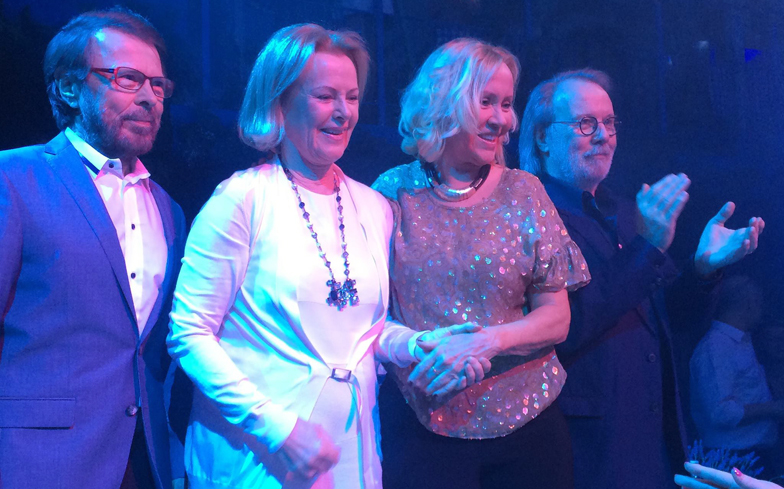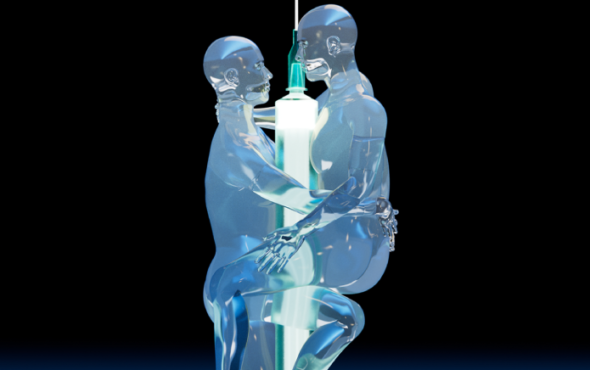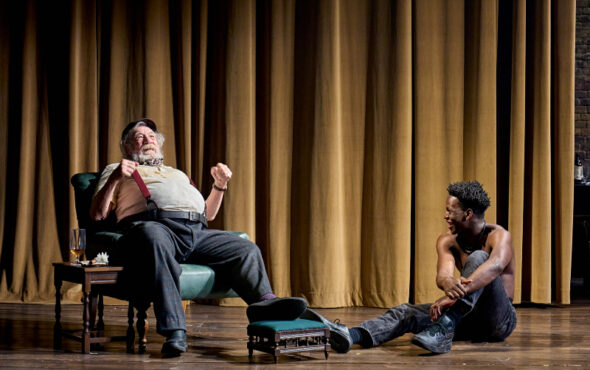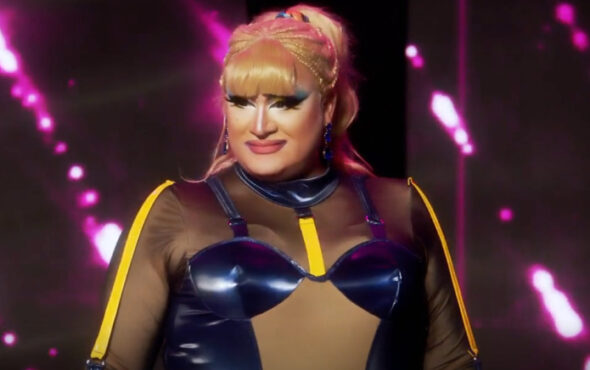
Ever since Dancing Queen, ABBA’s connection to the LGBTQ community has been pretty solid.
“We found out quite early that Dancing Queen had become an anthem and we were very proud that we’ve been chosen by the community,” Björn Ulvaeus tells us of the outpouring of love to ABBA from LGBTQ fans.
“As a Swede, long before most others, we had a much more open society and open attitudes. This is, in a way, a liberating anthem and it makes me proud. It’s a wonderful thing, it really is.”
Sadly the band did take a break in the early 80s, splitting up for a short while. However it was thanks to the outpouring of love and support from the queer community that ended up playing a key part in the return of ABBA to the world of music, as Björn explains.
“It was the gay community who underpinned the comeback,” he reveals. “People started recording, and one of the first bands that did it and was very important for us was Erasure. They did Take A Chance On Me.”
Björn continues: “Then we felt that we had the full support, and it made a lot of difference.”
Here we spend an hour in the company of the legendary music star to discuss bringing Mamma Mia: The Party to London’s 02, his love of Cher, Freddie Mercury and George Michael, and how the gay community have always been some of the biggest supporters of ABBA.
Where did this idea for Mamma Mia: The Party, a live dining and theatrical experience, come from?
This idea of this here gets away from the stress of having pre-show dinner, of rushing with a waiter beforehand, queuing at the theatre, queuing in the interval for a drink at the bar, and then afterwards trying to get a cab home. And if you want to go to a club after, you have to then queue again. It’s all in one, it’s all here! The moment you come into Mamma Mia: The Party, you sit down with your friends, have a glass of wine and you all talk. The show starts and it happens right here among you in the taverna. As a concept, I thought it was irresistible.

Is this the same story as we’ve seen in the Mamma Mia movie and musical, or is it a new idea?
We imagined, me and two other guys who wrote the original story in Sweden, that in the town of Skopelos, where I was when they filmed the exteriors of Mamma Mia, the first film. I was there high on a cliff edge when Meryl Streep did The Winner Takes It All, and there was that little chapel. When the film was a success, tourists would come to the Mamma Mia island of Skopelos. We imagined a guy called Nikos had a taverna, his wife came with the film crew but she stayed and they fell in love, and they come up with his idea to have a party for all the tourists – a Mamma Mia party. And then there’s little story playing out, a conflict ongoing, and at the end the conflict is resolved. This story takes place with his wife, daughter, all those people who work here, waiters, everyone. It’s told through spoken dialogue and ABBA songs, in three acts. Then everything came together. Also I would like to say that one of the ideas that made me want to do it was that I’d been to so many performances of the stage musical where they get up towards the end, dance and sing – as they do here – and I’ve always felt that people are in the party mood.
Is this not the best answer to people who just wanted to get up and dance?!
(Laughs) Well yeah, yeah! This is like extending that.
And you can’t not smile still when ABBA music plays.
Yes it’s amazing, and it’s a miracle because I don’t know what it was or what we did when we wrote the songs, or recorded them. I swear to you, none of us know why it brings happiness to a lot of people. That’s what I call a miracle!
And particularly resonates with the LGBTQ community.
Yes! Mostly the male gay community. We found out quite early that Dancing Queen had become an anthem and we were very proud that we’ve been chosen by the community because, as a Swede, long before most others, we had a much more open society and open attitudes. This is, in a way, a liberating anthem and it makes me proud. It’s a wonderful thing, it really is.
Somebody online described ABBA as ‘The Kings and Queens of Camp!’ I loved that.
(Laughs) Funny you should say that… there’s something about that in this story of Mamma Mia: The Party. It’s a good message and tag to have, and I love it.
Have you heard of RuPaul’s Drag Race?
Yes, I’ve heard of it.
Would you allow the drag queens on the show to lip-sync to an ABBA song?
Of course! Absolutely, absolutely. Without a doubt!
Let’s discuss the world of music today. Who in the charts has caught your eye?
I think Billie Eilish is very interesting. I like Taylor Swift. The combo of Katy Perry and Max Martin sometimes is very, very good. It’s all pop. I like pop more than anything else, as I’m sure you’ve heard from my choices.

Are there any queer icons of the music world that have inspired you?
Both George Michael and Freddie Mercury absolutely have, very much so! We were contenders with Queen. I know we did a television show together in Manchester sometime around 1975 and I remember, there was a bit of rivalry, and it was a huge studio. They were on one stage and we were opposite on the side of the room. We never actually said ‘hello’, but just looked at each other. They were great and a hell of an inspiration. So was George Michael. There’s nobody who sings with more light touch and kind of bounces on the rhythms in that way. It’s so easy for him… it’s nothing! I like that kind of deceptive way. Of course, it’s not easy and only he could do it.
Did you ever try and work together musically?
No, we never tried to work with anyone else. It would have been difficult the way we worked. Benny Andersson and I were sitting together in a room with a guitar and piano all day long, the next day and the next day. It wasn’t like writing a song in one day, it was getting a snippet of a song with something that you thought, ‘This is good!’ It could be a bridge, part of it, and then trying to build on that but not succeeding and then keeping that in the back of your head while moving onto something else. Weeks and months and then suddenly it’s, ‘Do you remember that little thing?’ And then, ‘God, yes!’. And to have a third person or someone else that’s not used to that route would not have worked.
Do you have a favourite ABBA song you’ve written?
No. I look back at different periods of our career with songs that came from different parts I’m proud of. We tried to develop the whole time from album to album, which means that I don’t have a favourite. I really don’t!

What was it like hearing Cher sing your songs on Mamma Mia 2?
Well I enjoyed it and it makes me humble. She was made for Fernando and has a dark, mysterious quality, not only the woman herself but her voice is husky as well. I said to one of her team, ‘She must record Chiquitita in Spanish’ as the they would go bananas. I don’t know if she’s done it yet, but I think she will.
Like the first musical, could we see a stage musical of Mamma Mia 2?
No, no. I think if there was to be a sequel of a stage musical, it would have to be something completely different. I wouldn’t like to tell the same story, it’s kind of uninteresting and it wouldn’t be fun. I am only driven by curiosity and things that I love to see what they can become. Another stage musical, which I don’t think there will be, but you never know. It would be an entirely different story.

Would a third Mamma Mia film be possible? Do you have any songs left to include?
(Laughs) That’s the problem with the songs, isn’t it? You’ll hear some songs in Mamma Mia: The Party that aren’t in either of the movies or the stage musical. There are songs, but it’s very hard to weave stories around them.
Your career, the musical, the movies. Tell me about a moment that stands out as a personal highlight…
What stands out would be obviously when we won Eurovision because that changed my life completely. I don’t remember much about the evening itself because it was so chaotic and I was so nervous. I didn’t look at the numbers there and then somebody said, ‘You’ve won!’. We were wanted on stage as songwriters as they took the songwriters first, before the artists. Benny was there already, but me, they thought I’d misunderstood and the security at the bottom of the stairs leading up to the stage told me to wait. ‘No, I’m a songwriter!’ He didn’t believe me but finally I was let up on stage with the girls as well. Then it was chaos after that. I remember waking up very early the next day thinking, ‘My God, what happened?!’ And also the enormity of it struck me. We were basically unknown outside of Scandinavia and now the whole world knows about us. It was so utterly, utterly strange. I have to say, in my professional life, that is the moment if I have to choose one.

How has the LGBTQ community supported your career with ABBA?
A lot, definitely. Although we didn’t know it or feel it until much later. We didn’t feel it during the 70s. Later, because in the 80s, especially the first half – we split up in 1982 – was like ABBA was forgotten. We thought that was it, we go on and do other stuff and ABBA will be forgotten. Then it was the gay community who underpinned the comeback. People started recording, and one of the first bands that did it and was very important for us was Erasure. They did Take A Chance On Me. They were the ones who started and there had been a movie before, but with the gay community underpinning the comeback. I think Erasure was the start of when we began feeling it, and people saying that Dancing Queen was a gay anthem. Then we felt that we had the full support, and it made a lot of difference.
Being in here as I said at the start, is exciting. Why should people come and discover this new version of ABBA and the Mamma Mia story?
It’s a matter of making people happy and to relax. It’s the kind of escapism that is allowed. Three or four hours to forget about everything else. Sing along to your heart’s content. Here you are free and can have a party and have fun. That’s what it is! And I think that is so important. Sandi Toksvig said to me the other say, ‘Do you understand how important this is?’ I didn’t. ‘People are so deliriously happy and that is something very valuable.’ I tend to agree with her.
More information on Mamma Mia: The Party can be found here.



